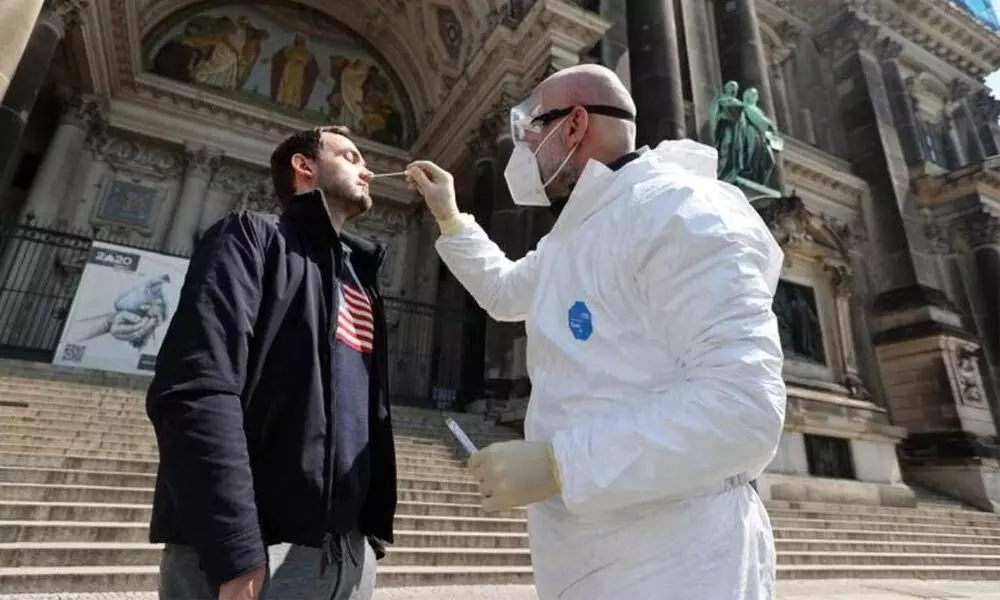Germany set to plan new virus measures as COVID numbers spike

Germany set to plan new virus measures as COVID numbers spike
The Robert Koch Institute registered 50,196 new cases, up from 33,949 daily cases a week earlier.
BERLIN: Germany's national disease control center reported a record-high number of more than 50,000 daily coronavirus cases Thursday as the country's parliament was set to discuss legislation that would provide a new legal framework for coronavirus measures.
The Robert Koch Institute registered 50,196 new cases, up from 33,949 daily cases a week earlier.
Infections have risen so quickly in recent days that hospitals in especially affected regions canceled planned surgeries again so medical personnel could focus on COVID-19 patients.
The institute also reported 237 daily COVID-19 deaths, bringing Germany's pandemic death toll to 97,198.
One of the country's top virologists, Christian Drosten, warned Wednesday that another 100,000 people could die in coming months if the country's vaccination rate didn't accelerate quickly.
Unlike some other European countries, Germany has balked at making vaccinations mandatory for certain categories of workers.
Yet the country has struggled to find ways to persuade more people to get shots voluntarily.
At least 67 per cent of the population of 83 million is fully vaccinated, according to official figures.
"In Germany, I must say, unfortunately, that our vaccination rate isn't high enough to prevent the fast spread of the virus," Chancellor Angela Merkel said Wednesday night.
Germany has a caretaker national government following a September parliamentary election.
The parties that are expected to form the next government plan to introduce legislation that would allow an "epidemic situation of national scope" declaration, in place since March 2020, to expire at the end of the month.
They want to replace it with a new legal framework for instituting coronavirus measures.
As during other periods of the pandemic, Germany has a patchwork of regional rules.
Most places restrict access to many indoor facilities and events to people who have been vaccinated, have recovered from COVID-19 or tested negative for the virus, although the latter option is being excluded in some areas.
Chancellor Angela Merkel said Friday that people have a duty to get vaccinated against the coronavirus to protect others.
She spoke as Germany grapples with a new surge of infections, which reached a record daily high of 50,000 on Thursday.
Merkel talked for 30 minutes with New Zealand Prime Minister Jacinda Ardern in a free-ranging virtual discussion on the sidelines of the annual Asia-Pacific Economic Cooperation forum.
New Zealand is hosting APEC and although Germany is not a member, Ardern said she's long admired Merkel, who will soon leave office.
"This virus is very, very tough," Merkel said.
She said it was an enormous scientific achievement to produce vaccines within a year of the outbreak, but that officials still weren't reaching a group of unvaccinated people.
"You have the right to get vaccinated," Merkel said.
"But, to a certain extent, you also, as a member of society, have the duty to be vaccinated to protect yourself and to protect others."
About two-thirds of Germany's 83 million people are fully vaccinated but the nation has resisted making vaccinations mandatory for certain workers.
Lawmakers are considering new measures in the face of the latest surge.
During their discussion, both Merkel and Ardern expressed their frustration over the rise of disinformation on social media.
"In the old days, we had certain events that happened in our society.
Television reported about it and the next day everyone talked about it," Merkel said.
"Today, everyone participates in his or her own social media. You only engage in a bubble that you meet on the internet."
If there was any advice she could give to future leaders, Merkel said, it would be to try to understand the perspectives of others and what prompts them to act in the way they do.
Ardern said one of the lessons she'd learned from the pandemic was to get people and companies engaged with trying to find solutions by presenting them with the data and showing them the problem.
She said everybody had been learning about the virus as it spread.
"Literally, you're building the plane whilst trying to fly," Ardern said.
The APEC forum concludes Saturday with a virtual meeting of Pacific Rim leaders, including US President Joe Biden and his Chinese counterpart Xi Jinping.











